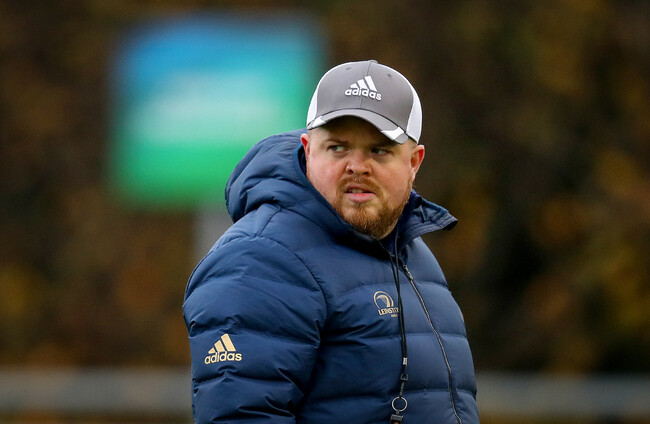NESTLED IN THE stands at Estádio Romelio Martínez in the Colombian city of Barranquilla, an Irishman will be willing Brazil to victory over the hosts tonight as they clash in the final game of the South American Tri-Nations.
Andy Skehan, the director of rugby at St Michael’s College in Dublin, could never have guessed the sport would take him to northeastern Colombia. He has been on quite the ride with rugby this year.
His day job involves heading up the rugby department at a school that has gained international renown for the quality of its programme and the number of professional players it turns out. Leinster and Ireland have benefited hugely from the St Michael’s production line. Skehan has been coaching in the school since 2006.
And recently, Skehan has been working as a consultant to other rugby organisations, taking him to the Netherlands, the US, and now Brazil. He’s been on 41 flights in the past six months but will be back home in Dublin by Tuesday, rolling into another big season with St Michael’s.
But first, this finale for the Tupis of Brazil against Colombia’s Tucanes. A few days on from squeezing to a win over Paraguay and having also played against Chile on what has been a long tour, the Brazilians will need to find another jolt of energy to finish on a high.
Skehan was drafted in by Brasil Rugby as the union seeks to improve what is a burgeoning professional rugby set-up in the country. They have big ambitions.
“Their aspiration is to go to the World Cup in 2027 and I think it’s very doable,” explains Skehan. “I really do think that based on what I’ve seen. To do that, they’ve got to beat Uruguay and Chile to qualify directly. Or to get into a play-off against USA or Canada, they will probably have to beat Chile.
“They’re quite capable of beating both but they need the processes that bring them to the point where they’re really confident. There’s not a moment to spare and it needs to start now with a concise plan to get better very, very quickly.”
Skehan has also been head coach of the Leinster Schools team, was in charge of UCD in the AIL, and worked with Old Belvedere and Wanderers. The quality of the St Michael’s set-up shows that he understands what an elite environment looks like. It’s no exaggeration to say St Michael’s’ programme is as good as some professional clubs’ set-ups.
So it makes sense that others are looking to draw on his knowledge. The connection to Brazil – who are ranked 28th in the world – is ex-Wanderers man Josh Reeves, a Kiwi who ended up as the Tupis’ out-half and is now director of rugby for Brasil Rugby after a season as Sligo’s player/coach.
Reeves and Skehan stayed in touch over the past decade, and the new Brazilian boss asked him to get involved when he took over a few months ago.
“I had already been travelling quite a bit,” says Skehan, “but I realised there are very few people who get the chance to do this in South America.”
Skehan linked up with Brazil in July at the union’s base in São Paulo, where their 35 full-time professional players train as the Cobras club side that competes in the Súper Liga Americana de Rugby. That side is the bases of the national team. There are other Brazil internationals who play abroad, like outstanding New York hooker Murilo Rebolo.
Skehan has delighted in getting to know what is a diverse squad, including one player who hails from deep in the Amazon rainforest and others who come from the favela slums on the outskirts of the big Brazilian cities.
“Around 13 of our guys come from favela backgrounds, which is just extraordinary stuff to become a full-time athlete out of that,” says Skehan.
“They effectively came from a government social project where players were exposed to rugby in the favela. It wasn’t full-contact rugby but they were taught passing and played touch-based games, got the interest from that, and were encouraged to join a club.”
The sheer scale of the country makes it a challenge in trying to identify players. Things taken for granted back in Ireland, like the recording of games for scouting and analysis, understandably have a way to go still in Brazil.
Those kinds of processes are what Skehan has been brought in to improve. He has had a direct influence on Brazil’s efforts on the pitch – their maul attack and defence, their 22 attack, observing and assessing training – but it’s also about everything else around the rugby.
“What I’m probably trying to add most value in is how we’re organised,” he says.
“For example, what’s the process for feedback around matches? They’re not used to having consistent processes here, so the feedback could be 24 hours later, 48 hours, 72 hours. It’s pointing out that consistency is needed so the players know what’s coming.”
He has helped to change simple things like the organisation of the team room in the hotel, and the structure of the days before and after match day.
“Little rituals we take for granted back home like jersey presentations – they just don’t have some of those things.
“I found they’re even very serious all the time so trying to break that up by having a laugh. Just because you’re professional doesn’t mean you can’t smile.”
There is lots for Brazil to work on – Skehan mentions their conditioning on a few occasions – but he has also been impressed by the ambition and quality of their players.
“I’ve seen guys here who if they were in Ireland, would have been professional or near professional players there. It’s just that there hasn’t been that same system here for them.”
His work with Brazil followed hot on the heels of consultancy work with Old Glory DC, a Major League Rugby club in the US. Skehan spent a week with their pro team and another week working on their development pathways.
“That was interesting because not all of the MLR teams are involved in developing players,” says Skehan.
“One of the issues is that they have a draft for the MLR. Think about the NBA – the Chicago Bulls don’t have an U18s basketball team because the whole system is taken care of for them and the draft means there’s an incentive not to bother with development because you could lose a player.”
The MLR has tweaked rules to ensure that clubs who invest time into players during their teenage years can contract them before the draft, explains Skehan, and he is enthusiastic about US rugby putting more time into developing players.
Back in March, Skehan started consulting with Castricumse Rugby Club in the Netherlands. The connection came through Bernard Jackman and the timing was good, although not for the reason Skehan would have wanted.
“It was the first year Michael’s had been knocked out of the cup in the first round for 18 years, so I had a bit of extra time,” says Skehan with a wry smile.
It was an enjoyable experience and Skehan explains just how much passion the seaside town had for rugby.
“Rugby was a big thing. People there are so dedicated to the game. So there is this amazing love for the game in all these places but they just need more resources, knowledge, and more understanding of how to run things.”
Dinner with Toulouse legend Emile Ntamack in the Netherlands overlooking the North Sea, sitting down with Tendai ‘The Beast’ Mtawarira when he was in the US – Skehan has had some unique experiences along the way.
He’s excited to be back in St Michael’s soon, overseeing a thriving rugby programme that involves 19 different teams, over 200 games per season, and plenty of young men with ambitions of playing for Leinster and Ireland.
“It’s not part of our objectives to create professional players,” says Skehan. “If it happens, fantastic.
“If you’re the biology teacher and you do a brilliant job, the student does really well in biology but then goes off and becomes a doctor, you still get a great thrill from it. That’s the way I look at it.
“One of the reasons there have probably been quite a few professionals is that they get a real love for the game and are really interested in staying involved. We try to bring them towards their potential.”
His four years as Leinster Schools head coach finished last season when Skehan but he says he loved his time working with many talented players and great staff like Stephen O’Hara, Brett Igoe, Mark McGroarty, and Rob Sweeney.
Skehan has come a long way since with the Clontarf minis. His own playing ambitions were cut short by an injury suffered in an AIL match when he and Devin Toner collided, so coaching found him early. He readily admits that he caught the bug hard.
It hasn’t let up since.
“One of the reasons people love being involved in sport is because you get these emotional apexes that happen once or twice a season that are kind of addictive.
“Being in a changing room an hour before a big match, there’s something in the room and you can just sense it. It’s not always a great feeling, it can be stomach-churning, but it’s a heightened experience and it’s quite addictive.”



